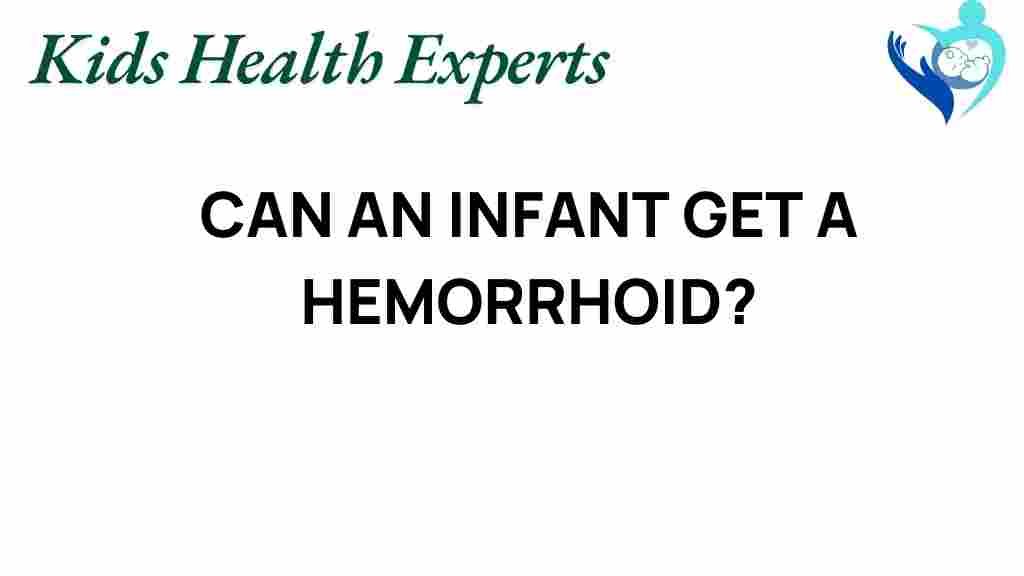Can Infants Really Suffer from Hemorrhoids?
When we think of health issues affecting infants, hemorrhoids might not be the first condition that comes to mind. However, as surprising as it may seem, **infants can indeed suffer from hemorrhoids**. This article aims to unpack this unusual condition, provide insights into pediatric health, and dispel some common health myths surrounding newborn care. By understanding the causes, symptoms, and solutions, parents can better ensure their children’s wellbeing.
Understanding Hemorrhoids in Infants
Hemorrhoids are swollen veins in the lower rectum and anus, similar to varicose veins. They can occur in various stages and can be classified into two main types:
- Internal hemorrhoids: These occur inside the rectum and are usually not visible.
- External hemorrhoids: These are located under the skin around the anus and can be seen and felt.
While it’s more common for adults to experience hemorrhoids due to various factors such as constipation, pregnancy, or prolonged sitting, infants can also develop this condition, albeit rarely.
Causes of Hemorrhoids in Infants
Understanding the causes of hemorrhoids in infants is crucial for effective **newborn care**. Some potential causes include:
- Constipation: Just like adults, infants can experience constipation, leading to straining during bowel movements, which can cause hemorrhoids.
- Diarrhea: Frequent bowel movements can irritate the anal area, potentially leading to hemorrhoids.
- Excessive crying: Infants who cry excessively may strain, increasing the risk of developing hemorrhoids.
- Genetics: Some children may be genetically predisposed to vein issues, making them susceptible to hemorrhoids.
Symptoms of Hemorrhoids in Infants
Recognizing the symptoms of hemorrhoids in infants is important for parents. Symptoms may include:
- Discomfort or pain: The infant may exhibit signs of discomfort, especially during bowel movements.
- Swelling: There may be visible swelling around the anal area.
- Bleeding: Bright red blood on the stool or in the diaper can be a sign of hemorrhoids.
- Irritability: The infant may be more fussy or irritable than usual.
If you observe these symptoms, it’s essential to seek **medical advice** to confirm the diagnosis and rule out other conditions.
Diagnosis and Treatment Options
Diagnosing hemorrhoids in infants typically involves a physical examination by a pediatrician. Here are the steps involved:
- Consultation: Discuss your observations and concerns with a pediatrician.
- Physical Examination: The doctor will examine the anal area for swelling or other signs of hemorrhoids.
- Medical History: Providing a detailed history of your child’s bowel habits can help in diagnosing the issue.
Once diagnosed, treatment options may vary based on the severity of the condition:
- Dietary Changes: Ensuring a high-fiber diet can help prevent constipation, a common cause of hemorrhoids.
- Hydration: Keeping the infant well-hydrated can also support healthy bowel movements.
- Warm Baths: Soaking in warm water can relieve discomfort and promote healing.
- Topical Treatments: Your pediatrician may recommend safe topical treatments to reduce swelling and pain.
Preventing Hemorrhoids in Infants
Prevention is always better than cure. Here are some **parenting tips** to help avoid hemorrhoids in infants:
- Monitor Bowel Movements: Keep track of your infant’s bowel habits and seek help if you notice persistent constipation or diarrhea.
- Encourage Regular Feeding: Regular feeding schedules can promote consistent bowel movements.
- Gentle Tummy Massages: Massaging the infant’s tummy can help stimulate bowel movements.
- Avoid Straining: If your child seems to be straining excessively during bowel movements, consult your pediatrician.
Troubleshooting Common Concerns
As a parent, you may encounter various concerns regarding your infant’s health. Here are some troubleshooting tips related to hemorrhoids and bowel health:
- Inconsistent Bowel Movements: If your infant has less than one bowel movement every few days, consider consulting your pediatrician.
- Blood in Stool: Always report any signs of blood in the stool to your pediatrician, as it can indicate more serious health issues.
- Excessive Crying and Fussiness: If your baby is excessively crying and seems uncomfortable, it may be worth discussing with your doctor.
Health Myths about Infants and Hemorrhoids
There are several **health myths** regarding infants and hemorrhoids that can cause unnecessary worry among parents. Here are a few:
- Myth 1: Infants cannot get hemorrhoids – While rare, it is possible for infants to develop hemorrhoids.
- Myth 2: Hemorrhoids are only caused by constipation – While constipation is a common cause, other factors such as diarrhea and excessive crying can also contribute.
- Myth 3: Surgery is the only option for treatment – Most cases of hemorrhoids in infants can be managed with simple lifestyle changes and home remedies.
Conclusion
In conclusion, while **infants can suffer from hemorrhoids**, it is a rare condition that can often be managed effectively with proper care and attention. By understanding the causes, symptoms, and prevention strategies, parents can ensure their children’s wellbeing and dispel any myths surrounding this health issue. If you suspect your infant may have hemorrhoids, it’s crucial to seek **medical advice** for accurate diagnosis and treatment options.
For additional resources on pediatric health, consider visiting HealthyChildren.org for expert advice on common health conditions affecting children. Remember, taking proactive steps in your child’s health can lead to a happier and healthier life.
For more parenting tips and insights into your child’s health, check out our article on common conditions in infants.
This article is in the category Conditions and created by KidsHealthExperts Team
